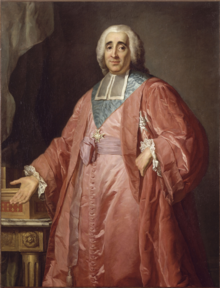René Nicolas de Maupeou
| René Nicolas de Maupeou | |
|---|---|
 |
|
| Chancellor of France | |
|
In office September 16, 1768 – July 1, 1790 |
|
| First president of the parlement of Paris | |
|
In office October 12, 1763 – September 15, 1768 |
|
| Personal details | |
| Born |
February 25, 1714 Montpellier, France |
| Died | July 29, 1792 (aged 78) Le Thuit, France |
| Political party | Bourbon Crown |
| Profession | , magistrate |
René Nicolas Charles Augustin de Maupeou (French: [mopu]; 25 February 1714 – 29 July 1792) was a French lawyer, politician, and chancellor of France, whose attempts at reform signalled the failure of enlightened despotism in France. He is best known for his effort to destroy the system of parlements, which were powerful regional courts, in 1770-74. When King Louis XV died in 1774, the parlements were restored and Maupeou lost power.
He was born in Montpellier to a family ennobled in the sixteenth century as noblesse de robe, the eldest son of René Charles de Maupeou (1688–1775), who was president of the parlement of Paris from 1743 to 1757.
In 1744 he married a rich heiress, Anne de Roncherolles (1725–1752), a cousin of Madame d'Épinay, the friend of Rousseau who moved in the circles of the Philosophes. Entering public life, he was his father's right hand in the conflicts between the parlement and Christophe de Beaumont, archbishop of Paris, who was supported by the court. Between 1763 and 1768, dates which cover the revision of the Calas case that Voltaire had championed and the trial of the comte de Lally, Maupeou was himself president of the parlement. In 1768, he became chancellor in succession to his father, who had held the office for twenty four hours only, largely in order to permit him to retire with the prestigious title. With the disgrace of Choiseul, 24 December 1770, Maupeou was the chief minister.
...
Wikipedia
